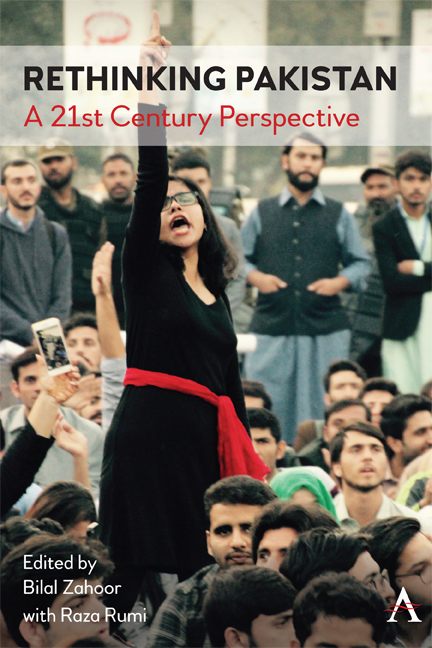Book contents
- Frontmatter
- Dedicated
- Contents
- Acknowledgements
- Introduction
- Part I Identity, Religion and Radicalisation
- Part II Development, Reform and Governance
- Part III Rights, Repression and Resistance
- Part IV Sex, Gender and Emancipation
- Part V Conflict, Diplomacy and Foreign Policy
- Contributors
- Bibliography
- Index
Chapter 14 - Rescuing the White in the Flag
Published online by Cambridge University Press: 20 January 2022
- Frontmatter
- Dedicated
- Contents
- Acknowledgements
- Introduction
- Part I Identity, Religion and Radicalisation
- Part II Development, Reform and Governance
- Part III Rights, Repression and Resistance
- Part IV Sex, Gender and Emancipation
- Part V Conflict, Diplomacy and Foreign Policy
- Contributors
- Bibliography
- Index
Summary
Even after 71 years of independence Pakistan continues to face a crisis of identity. As a country born out of a two-nation theory (i.e. Hindus and Muslims are different) with Islam as its raison d’être, it was perhaps inevitable that faith-related problems would challenge its very existence. While it is General Zia ul Haq who is largely responsible for the spread of religiosity in Pakistan, the seeds were sown by the first prime minister and the first constitution of the country. It was Liaquat Ali Khan who defined the nature of the state as “Islamic” through the preamble to the constitution, also known as “Objectives Resolution”.
Many believe that Pakistan, while retaining its Islamic identity, would have seen a more tolerant Islam if East Pakistan had remained with the federation. Islam was supposed to be the binding force between East and West Pakistan, but it failed to be so in the face of rising Bengali nationalism; this nationalism, which later developed into an independence movement, was distinctly secular. In response, Pakistan hung on even more desperately to Islam – Pakistani soldiers taking part in the crackdown against East Pakistan's freedom movement were brainwashed into believing that Bengalis were somehow “lesser” Muslims. The violence inflicted on both Bengali Muslims and Hindus by the Pakistan Army in 1971 is a matter of record, though there may be differences in the numbers cited of those killed or raped.
The break-up of the country did not lead to soul-searching vis-à-vis its overdependence on the Islamic identity. In fact, treated as a pariah state by Western powers for its actions in East Pakistan, the government of Zulfikar Ali Bhutto turned towards Arab countries for support. The Arab financial assistance came with a price tag that would prove to be very expensive: the condition of indebtedness essentially turned Pakistan into a slave nation as conservative Arab governments, led by Saudi Arabia, began to dictate state policies in matters of faith. Soon after, Ahmedis were declared non-Muslims and the Wahhabi interpretation of Islam began to permeate various segments of the society.
- Type
- Chapter
- Information
- Rethinking PakistanA 21st Century Perspective, pp. 149 - 158Publisher: Anthem PressPrint publication year: 2020



